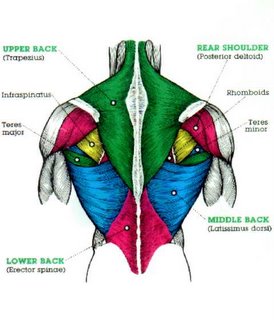
From whatever angle or perspective you look at it, a sphere has the same visual proportions. I am a constant - nothing more, nothing less...and my musings just that - random thoughts pulled from the recesses of my daily observations. Welcome aboard.
Thursday, 26 January 2006
Republic Day
Happy India Republic day greetings to everyone, including our friends across the electrified barbed wire border... :)


Friday, 6 January 2006
My back !
 The human body is an amazingly complex marvel of evolution. Yet much of it remains undiscovered in terms of cause and effect of ailments that beset it. Take me for example... :) 3 days ago whilst tying my shoelaces prior to leaving the house for work, I got this inexplicable shooting pain that went across my back....I felt like some black dude that had just been taser shocked by Toronto police (not that I've ever had the pleasure of being tasered by any law enforcement agent...LOL).
The human body is an amazingly complex marvel of evolution. Yet much of it remains undiscovered in terms of cause and effect of ailments that beset it. Take me for example... :) 3 days ago whilst tying my shoelaces prior to leaving the house for work, I got this inexplicable shooting pain that went across my back....I felt like some black dude that had just been taser shocked by Toronto police (not that I've ever had the pleasure of being tasered by any law enforcement agent...LOL).The pain has not fully subsided and even now, three full days later, I have this area just below my right shoulder blade which sears me like a hot poker...sleeping is painful and only gets better during the day when I'm upright. (All this coming from a person who previously never got back pain and gets a headache maybe once every 2 years). I don't really want to see a doctor - medical or witch - coz I suspect the pain will go away just as quickly as it arrived (I hope). I will check out my 'medical cabinet' over the weekend and see if certain medicines like Black Label and/or Bacardi will help loosen the intransigent muscles in my back.... :))
Wednesday, 4 January 2006
Egyptian film tackles social taboos
 One suspects that issues raised in this film stretch far beyond the borders of Egypt. Why is it that many established religions and socially conservative societies, especially those of the more dogmatic variety, attempt to suppress certain indeniable aspects of human behaviour ? (As an aside, honour killings are one of the more extreme examples of ignorant social reaction, even when both partners are of the same race, same religion, same region and obviously like each other).
One suspects that issues raised in this film stretch far beyond the borders of Egypt. Why is it that many established religions and socially conservative societies, especially those of the more dogmatic variety, attempt to suppress certain indeniable aspects of human behaviour ? (As an aside, honour killings are one of the more extreme examples of ignorant social reaction, even when both partners are of the same race, same religion, same region and obviously like each other).Article from Al-Jazeera:
http://english.aljazeera.net/NR/exeres/7B692E07-80C6-4D3A-B44D-A2CC737815E8.htm
A new Egyptian film has sparked controversy over its scenes of intimacy between a woman wearing the Islamic headscarf and man on a bus. A young man on the back of a Cairo bus kisses and gropes the woman next to him as he peels off her hijab.
The scene from an independent film about sex and double standards in Egypt shows little nudity but provokes gasps of surprise from audiences in the largely conservative country.
Director Ahmed Khaled's 14-minute film, the Fifth Pound, follows the weekly bus journey of a young man and woman who dodge the suspicious glances of other passengers and exploit the unused back seats to indulge in physical intimacy.
Cairo has a long-established film industry and is traditionally regarded as the centre of Arab artistic production but themes linking sex and religion remain largely untouched by filmmakers in the predominantly Muslim country.
In Khaled's film, verses from the Quran play in the bus as the driver steals glances in his rear-view mirror of the young man and the veiled woman.
Khaled says most venues in Egypt, the Arab world's most populous nation, have refused to show his film because its subject matter could draw criticism in a country where the hijab is seen by many as the height of female respectability.
But many young Egyptians say the setting is entirely realistic. They say use of public buses as a setting for romantic encounters is so common the air-conditioned vehicles favoured by couples have earned the nickname "mobile beds".
Khaled said: "The film is about double standards in our society, about how people try to portray themselves in one way and then behave in a different conflicting way.
"There are a lot of things that happen in Egyptian society that Egyptians don't like to talk about."
"The film is about double standards in our society, about how people try to portray themselves in one way and then behave in a different conflicting way"
Khaled said independent filmmakers in Egypt seeking to tackle controversial issues often struggle finding funds to make the films, and, once done, they cannot always raise the cash to show them at festivals at home or abroad.
He said: "The people who make the decisions, those people in the government cultural centres, they like safe films that don't break any boundaries."
Among the boundaries that young Egyptian women want to challenge is the preferential treatment men receive.
Rania al-Far, a film-goer, said: "What will shock people about this film is the fact that it's a woman, and a woman in a veil at that, who is doing these things ... but no one says anything about what men are doing."
The film shows the young couple boarding the bus and paying the driver four Egyptian pounds ($0.70) for two tickets before shuffling past other suspicious passengers on their way to the back seats.
In the film, the young man address the audience, saying: "The scariest thing is the mirror which looks over the bus and which is used by the driver to see what happens in the back."
The bus driver keeps looking at the couple through the mirror as if waiting to catch them indulging in illicit activity.
As the bus continues its journey through the streets of Cairo, the film cuts to a dream sequence where the driver walks to the back of the bus, takes the young man's seat and begins to kiss and disrobe the woman.
Khaled said: "That's double standards... The driver is playing the Quran in the bus and watching the couple as if he is a moral guardian but inside his head he fantasises about being the one who is with the girl."
As the couple leave the bus, the young man hands the driver an extra, fifth, pound.
The young man adds in the narration: "He knows nothing, and you did nothing."
Khaled said he was trying to show that some people give the impression of religiosity and ascetic piety but secretly covet worldly attractions such as money and sex.
He said: "We have a lot of problems and issues in Egypt; but we are not going to deal with them if we pretend they are not there."
Hard work = happiness ?
Work hard people.... :)
Article link:
http://news.bbc.co.uk/2/hi/health/4577392.stm
Hard work may be the last thing people want as they return to their jobs after the festive break, but experts say it could be the key to happiness.
Researchers from Gothenburg University in Sweden have been studying published data on what makes people happy. They believe working to achieve a goal, rather than attaining it, makes people more satisfied - although they said good relationships were important.
UK experts agreed, but said the work had to match an individual's strengths.
The Gothenburg team have been studying hundreds of interviews carried out with people across the world to find out what makes them feel fulfilled. They said winning the lottery or achieving a goal at work gave a temporary high, but it did not last.
Instead, they found that working hard to reach a target was more fulfilling. Lead researcher Dr Bengt Bruelde, from the university's philosophy department, said: "The important thing is to remain active.
"From our research the people who were most active got the most joy. It may sound tempting to relax on a beach, but if you do it for too long it stops being satisfying."
He said the full research would be published in the summer.
Averil Leimon, of the British Psychological Society, said: "Hard work is satisfying, but only if it suits you.
"The work has to use a person's strengths otherwise it can be demoralising." If it does, research has shown that the happiness is not even linked to the rewards that are on offer.
But she added: "Relationships can also have a significant impact. Strong relationships whether through family, the church, friends or work can inoculate you against feeling low."
Article link:
http://news.bbc.co.uk/2/hi/health/4577392.stm
Hard work may be the last thing people want as they return to their jobs after the festive break, but experts say it could be the key to happiness.
Researchers from Gothenburg University in Sweden have been studying published data on what makes people happy. They believe working to achieve a goal, rather than attaining it, makes people more satisfied - although they said good relationships were important.
UK experts agreed, but said the work had to match an individual's strengths.
The Gothenburg team have been studying hundreds of interviews carried out with people across the world to find out what makes them feel fulfilled. They said winning the lottery or achieving a goal at work gave a temporary high, but it did not last.
Instead, they found that working hard to reach a target was more fulfilling. Lead researcher Dr Bengt Bruelde, from the university's philosophy department, said: "The important thing is to remain active.
"From our research the people who were most active got the most joy. It may sound tempting to relax on a beach, but if you do it for too long it stops being satisfying."
He said the full research would be published in the summer.
Averil Leimon, of the British Psychological Society, said: "Hard work is satisfying, but only if it suits you.
"The work has to use a person's strengths otherwise it can be demoralising." If it does, research has shown that the happiness is not even linked to the rewards that are on offer.
But she added: "Relationships can also have a significant impact. Strong relationships whether through family, the church, friends or work can inoculate you against feeling low."
Subscribe to:
Comments (Atom)